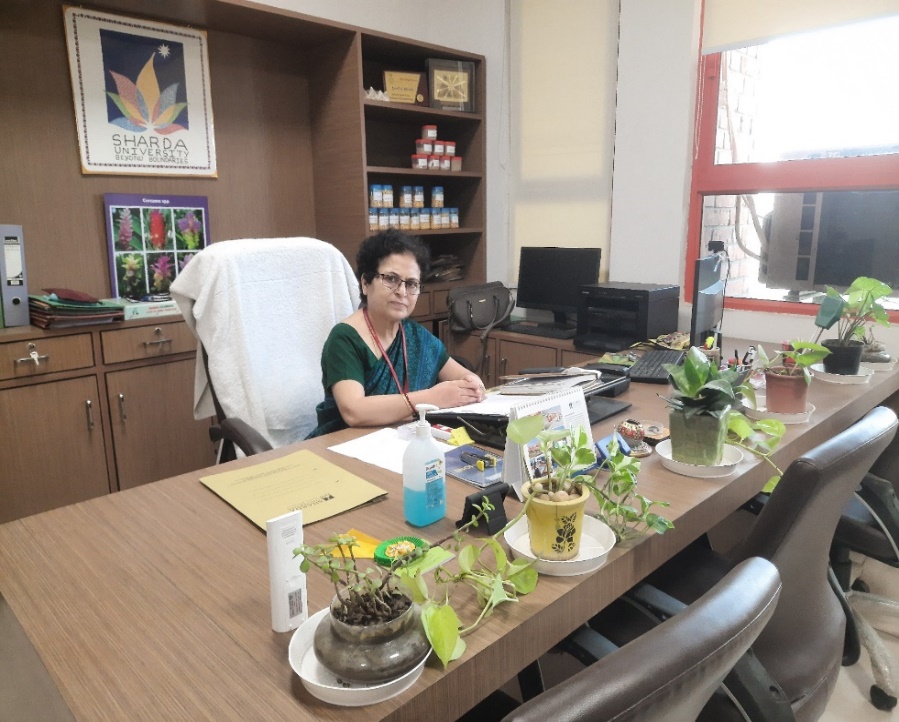Sharda School of Agricultural Sciences
Download BrochureOverview
Sharda Sharda School of Agricultural Sciences is dedicated to providing high quality education and training in the field of Agricultural Sciences following curricula underpinning multidisciplinary approach by integrating technological advancements. The School strives to meet international standards as well generate technologies and motivated trained human resource to foster sustainable agricultural production, protection and processing systems as envisaged by Indian Council of Agricultural Research, UGC and the NEP-2020 of the Government of India.
The School offers 4 year B.Sc. (Hons.) Agriculture, 2 year M.Sc. (Agriculture) Agronomy and 3 year Ph.D. degree programmes. The School has eminent and highly qualified faculty with Doctoral and Post-Doctoral research experience and excellent track record in teaching and research in the current areas of Agriculture and allied Sciences. These programmes are also supported by the faculties and facilities of a number of other Departments including Basic Sciences, Biotechnology, Microbiology, Food Science, Engineering, Economics, Business, Languages, Law, Sociology etc. The agri-science programmes are an amalgam of several relevant branches of science and technology and are aimed at producing job oriented, well trained, groomed and motivated human resource for various agricultural, horticultural and allied sectors. Students from all over India and foreign countries like Nepal, Nigeria, Somalia, Malawi, Sudan, Burkina Faso, and others are admitted every year.
Sharda School of Agricultural Sciences also focuses on extracurricular activities, overall personality development and inculcating the ethical and moral values in students. Job-oriented training, innovation opportunities and experiential learning on various types are provided. Many of the graduates have secured very good placements in leading companies or joined higher education programmes in leading universities. Students are motivated to interact with the farmers and participate actively in seminars, symposia, conferences and workshops with opportunities to interact with renowned national and international scientists and industry experts.
Objective
- To foster a strong foundation in agricultural and horticultural principles and practices to make students globally competitive.
- To develop strong interest in agricultural and horticultural technologies by enhancing the problem-solving skills in students so that they are motivated to pursue research and entrepreneurship development.
- To emphasize on the peri-urban agriculture and protected cultivation to address the needs of the growing population and changing environment.
- To train the students to develop and demonstrate technology for income and employment generation.
- To create a sense of responsibility among students towards the use of scientific knowledge in agriculture for the benefit of farmers.
Key Highlights
- Well-equipped with spacious classrooms and 14 laboratories to provide quality teaching and research opportunities for the students.
- Trainings to students imparted in the field and climate-controlled polyhouses through conduct of research trials and demonstrations.
- State-of-the-art plant-tissue culture and hydroponics research facilities.
- Course and syllabus in conformity with the ICAR guidelines.
- Fully developed Crop Cafeteria, water-body and net house in the campus.
- Well-developed Apiary unit and Mushroom House in the campus.
- Cultivation of high-value vegetables, like different kinds of Lettuce, Chinese cabbage, Spinach, Beetroot, cherry tomatoes etc. on clean soil with clean water and without pesticides is grown in campus under the banner, Sharda Organics.
- Value-added agri-products are developed in a well-equipped post-harvest laboratory.
- Experiential Learning-cum-Innovation Centre.
- Industry/Institute visits of students to demonstrate different technologies for intensive and commercially oriented peri-urban cultivation of horticulture crops for improved quality and productivity.
- Social Responsibility by catering to the farmers of the area by training on good agricultural practices and opportunities in peri-urban farming.
- 17 acre agricultural farmland for use of the farm for research and education/ instruction.
- MoUs for educational and research with leading ICAR and other institutions and industry.



